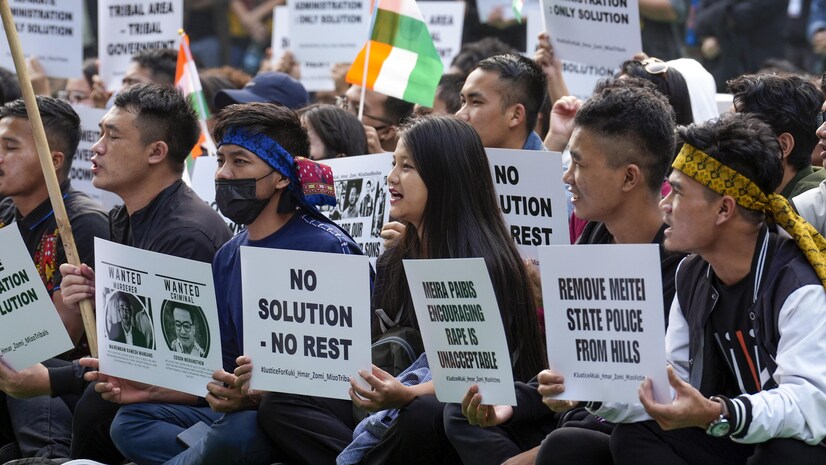
Manipur is a region across the chicken neck of the Indian state neighboring Myanmar. The entire region is already unsettled due to separatist movements in Assam, Nagaland and now finally Manipur. The ongoing conflict in Manipur, ignited on May 3, 2023, represents not merely a local strife but a profound struggle for identity, survival, and justice. At the heart of this deadly confrontation lies the clash between the Hindu Meitei community, predominantly situated in the Imphal Valley, and the Christian Kuki-Zo Tribes residing in the surrounding hill districts. The roots of this conflict extend deep into the socio-political landscape of the region, exacerbated by governmental decisions that reflect a disturbing trend of ethnic favoritism and, arguably, Hindu supremacy.
Historically, the Kuki community was relocated from Myanmar during British colonial rule in the late 19th century. Seeking to secure strategic locations along the India-Myanmar border, the British moved Kuki tribes into the hilly terrains of Manipur. This migration not only altered the demographic makeup of the region but also established a complex relationship between the Kuki-Zo (Christians) and Meitei (Hindu) communities, a relationship fraught with tension that has persisted through the decades. The current conflict has revived historical grievances and territorial anxieties, complicating the present dynamics as both communities vie for recognition and resources.
The spark for this turmoil was a ruling from the Manipur High Court that favored granting Scheduled Tribe (ST) status to the Meitei community. This decision has far-reaching implications, as it would potentially allow Meiteis access to land that has been historically reserved for the Kuki-Zo tribes. The Kuki-Zo community, despite comprising around 28% of the state’s population and holding ST status, finds itself increasingly marginalized, as the Meiteis—who constitute 53% of the population—are supported by state mechanisms that skew the balance of power in their favor.
The violence that has ensued is staggering: over 250 lives lost and more than 60,000 displaced, with unofficial estimates indicating an even graver toll. Families have been torn apart, and entire communities have been uprooted. The brutality has been amplified by the involvement of the Manipur police, which has shown an alarming bias toward the Meitei community. Public videos have surfaced showing police constables, who are Meitei, actively participating in arson and assaults against Kuki-Zo individuals, while others simply stood by, effectively enabling this ethnic cleansing. The visceral pain and fear felt by the Kuki-Zo people are palpable as they watch their loved ones suffer and their homes burn..
The plight of the Kuki-Zo community is further complicated by the fact that neighboring Kuki-Chin tribes in Myanmar, sharing a common ancestry, have intensified cross-border attacks in solidarity with their Kuki-Zo allies. This regional solidarity highlights the extent of Kuki-Zo marginalization within India, as they seek assistance from kin across borders, exacerbating an already volatile situation.
What makes this conflict even more troubling is the tacit endorsement of police brutality against the Christian Kuki tribes by the Indian government, which many perceive as a manifestation of Hindu supremacy. The prioritization of Hindu Meitei interests over the rights and security of the Kuki-Zo tribes has been glaringly apparent. This favoritism creates an environment where police forces act not as neutral enforcers of law and order, but as enforcers of an ethnically and religiously charged agenda, further entrenching divisions within society.
The suffering of the Kuki-Zo people is palpable and multifaceted. Displacement and loss of life are but two aspects of a larger narrative of systemic ethnic cleansing. As Kuki-Zo individuals flee their homes, they do so not only from physical violence but also from an overarching governmental attitude that sees their identity as secondary to the interests of a Hindu majority. The government’s actions have instilled fear and desperation among the Kuki-Zo, prompting a mass exodus and fracturing communal bonds that have long existed in the region. Communities that once thrived together are now splintered, with the threads of shared history and culture unraveling in the wake of violence.
Moreover, the Indian government’s approach to the situation raises critical questions about the integrity of the Indian State, which has historically boasted itself of being a secular democracy. The overt favoritism shown to the Meitei community undermines the foundational principles of equality and justice that are supposed to underpin a democratic society. Instead, we witness a state apparatus that seems willing to sacrifice the rights of a minority community in favor of a dominant group, further entrenching societal divides.
The implications of this conflict extend beyond immediate violence. The marginalization of the Kuki-Zo community is emblematic of a larger narrative in India, where ethnic and religious identities dictate the distribution of power and resources. The state’s complicity in this marginalization reflects a broader pattern of governance that prioritizes one group’s interests over another, fostering division rather than unity. In each conflict, the government appears to shape the narrative to reinforce Hindu supremacy, leaving minority communities vulnerable to violence and oppression.
As the Indian government grapples with this crisis, it must confront the uncomfortable truths of its own biases and the destructive impact of its actions on the lives of the Kuki-Zo tribes. The conflict in Manipur serves as a poignant reminder of the complex interplay between ethnicity, religion, and state power in India. If justice is to be served, it must come not through the lens of ethnic superiority, but through an unwavering commitment to equality, empathy, and the preservation of human rights for all communities. The recent decision by the Manipur High Court to grant Scheduled Tribe (ST) status to the Meitei community has deep echoes of what happened in Jammu and Kashmir, where revoking Article 370 opened the door for Indian Hindus to buy land in a region that has long been home to a Muslim majority. This pattern of shifting demographics highlights a troubling trend that parallels policies seen in Israel, where the displacement of native Muslim community has effectively led to ethnic cleansing leading to demographic changes. These actions not only disrupt the lives of countless individuals but also jeopardize the rich tapestry of cultures that once made up India.
In conclusion, the once secular India that spares no effort to highlight the grievances of minorities vis a vis resources, is itself marred by conflicts and separatists’ movements from Kashmir in the North West to Nagaland, Assam and now Manipur in the North East of India. The Indian Government, as in the state of Kashmir, has recently given shoot to kill orders via draconian laws like AFSPA, that bypasses all fundamental human rights. It is further alarming for India that such an unrest in the region would pull countries bordering Myanmar and even China in the long run if its economic interests are effected. Therefore, New Delhi should be more worried about its own deteriorating internal situation, rather than being concerned about internal dynamics of its neighbors.



















Leave a Reply